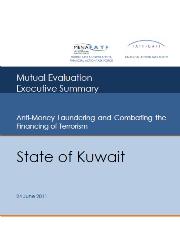This report presents a summary of the evaluation of the anti-money laundering (AML) and combating the financing of terrorism (CFT) measures in place in the State of Kuwait at the time of the on-site visit by the assessment team (17 October – 1 November 2010).
The State of Kuwait is a member of the Middle East & North Africa Financial Action Task Force (MENAFATF). It is also a member of the Gulf Co-operation Council, which is a member of the Financial Action Task Force (FATF). This evaluation was conducted by the International Monetary Fund (IMF) and adopted by the FATF at its Plenary meeting in June 2011.
Key findings
The anti-money laundering law (the AML Law), containing the core elements of the AML regime, was introduced in 2002. It imposes customer due diligence (CDD) obligations on a range of financial institutions, and requires these financial institutions to submit suspicious transaction reports (STRs) to the Public Prosecutor’s Office. However, the AML Law did not criminalize the financing of terrorism and did not put in place a mechanism to implement the United Nations Security Council Resolutions (UNSCRs). Kuwait has initiated a relatively small number of prosecutions for money laundering and of orders to confiscate assets. The AML Law was never amended; however, a new draft law was sent before the National Assembly in 2007.
Several indicators suggest that money laundering and terrorist financing operations do not pose a serious threat to the Kuwaiti economy. Although there is currently no evidence of significant money laundering in the country, Kuwait’s financial sector is growing rapidly in terms of banking sector assets. This development has the potential of creating a suitable environment for money launderers and terrorist financers to exploit. No major terrorist activity has been recorded in the country. Less serious terrorist activity has been noted.
The AML/CFT framework has many shortcomings. The main deficiencies of the regime are listed below.
Legal and Law Enforcement framework
- The money laundering criminalization does not cover all serious predicate offenses, and terrorist financing is not criminalized.
- The Kuwait financial intelligence unit is not established as an independent national centre responsible for the receipt, analysis, and dissemination of STRs and other information regarding potential money laundering or terrorist financing.
- Some supervisors are not provided with adequate powers to monitor and ensure AML/CFT compliance by financial institutions and designated non-financial businesses and professions (DNFBPs), and do not have sufficient sanctioning powers.
Preventive Measures
- The preventive measures for financial institutions and DNFBPs are not comprehensive.
- The licensing requirements for financial institutions are not comprehensive. In addition, there are no laws or regulations that impose controls on the ownership structure of financial institutions.
- Supervisors only apply fit and proper requirements on directors and senior management of banks; there are no such requirements on other financial institutions;
Other issues
Statistics are not collected and guidance and feedback are not adequately provided to financial institutions and DNFBPs.


 Twitter
Twitter
 Facebook
Facebook
 Instagram
Instagram
 Linkedin
Linkedin
